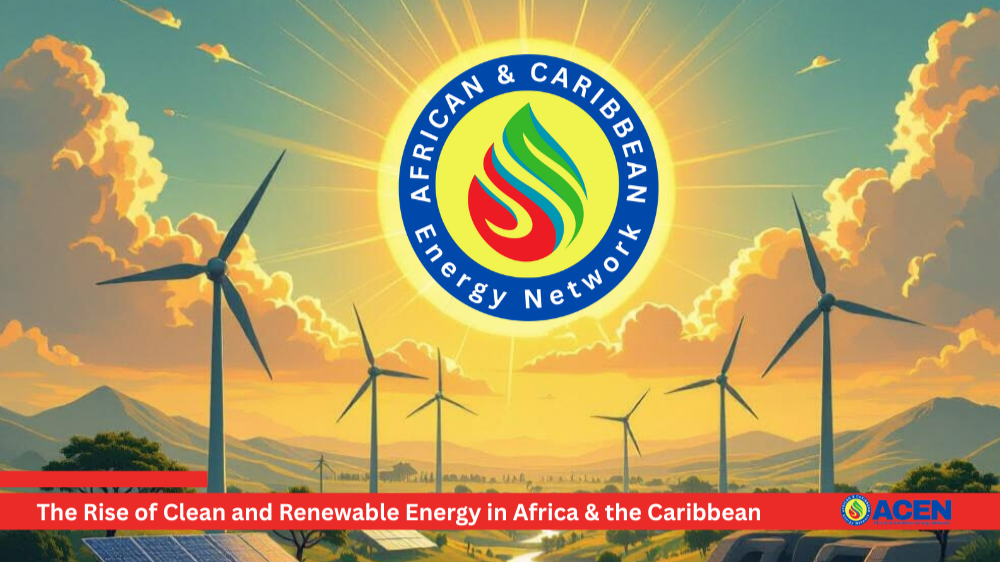Info@acenergynetwork.org | 9950 Westpark Dr, Suite 520, Houston, Texas 77063, US
The Rise of Clean and Renewable Energy in Africa & the Caribbean
7/23/20253 min read


As clean and renewable energy sweeps across Africa and the Caribbean, communities once trapped in energy poverty are gaining new hope. This dynamic shift is not only transforming power sectors but also aligning closely with the core mission of the African & Caribbean Energy Network (ACEN): to end energy poverty for 1 million people by 2035.
Africa
Africa’s journey toward renewable energy is gaining remarkable momentum. Over 55% of Africa’s energy currently comes from renewables, and the continent boasts 60% of the world’s best solar resources 1,2,3. Countries such as Egypt, Morocco, and South Africa are leading the charge, but growth is widespread, with ambitious goals shaping national and regional agendas. 4. Hydropower and solar dominate, while wind and geothermal gain steady ground.
Solar energy emerges as the most promising technology—home to the world's strongest solar resources and rapidly declining installation costs. By 2030, solar PV is projected to outcompete other sources continent-wide 2.
Wind and hydropower remain vital, particularly in regions with suitable geography and infrastructure.
Caribbean
The Caribbean faces unique challenges due to energy reliance on imported petroleum, but the narrative is changing. Advances in solar, wind, hydro, and battery storage mean renewables now form an increasing share of the regional energy mix. Some islands, like Barbados, lead with innovative solar water heating, while others explore geothermal and hydro potential for 100% renewable power. 5, 6, 7.
Transitioning to clean energy delivers a cascade of sustainable benefits:
Reduced Carbon Emissions: Renewables slash greenhouse gas output, helping mitigate climate change and improving air quality across urban and rural communities. 8, 9, 10.
Improved Public Health: Less pollution means healthier lives, with decreased respiratory and environmental health risks 9.
Expanded Economic Opportunity: Investments in renewables create jobs in manufacturing, installation, and maintenance, boosting local economies and strengthening value chains 8,11.
Energy Independence & Resilience: By leveraging indigenous resources, countries reduce reliance on foreign fuels, stabilize energy prices, and build greater resilience against global shocks and natural disasters 7,9.
Environmental Protection: Renewables preserve wildlife habits and reduce ecosystem degradation compared to fossil fuel-based generation 8,10.
Across Africa and now in the Caribbean, there is a growing focus on developing "local content" in the clean energy sector:
Local content policies aim to boost job creation and skills development by ensuring domestic businesses and workers participate fully in renewable projects 12, 13, 14.
Countries like Nigeria, Ghana, Senegal, and Namibia set ambitious targets to increase the local share in energy projects—building capacity, transferring technology, and supporting entrepreneurship at home 12, 13.
These strategies advance economic independence and sustainable, inclusive growth for local communities and SMEs across the energy value chain 12, 13, 14.
Africa: Solar, Hydropower and Solar PV is rapidly expanding; hydropower also remains a key pillar. 2, 15.
Caribbean: Solar, Hydro, Geothermal (select areas) Solar is surging, hydro and geothermal used where suitable. 5, 6, 7, 16.
Solar is the fastest-growing and often the most cost-effective source, especially in Africa’s sun-rich climates and Caribbean islands 2, 15, 16. Hydropower remains crucial in specific countries, while wind and geothermal are making important strides based on local resources. 2, 5.
The African & Caribbean Energy Network’s mission—to free 1 million people from energy poverty by 2035—is powerfully reinforced by these trends:
Expanding Access: Renewables allow for decentralized and off-grid systems, reaching rural and underserved populations where traditional grids can’t. 1, 17, 7.
Sustainable Development: Clean energy supports the United Nations Sustainable Development Goals by promoting social, economic, and environmental progress for all.
Empowering Women & Youth: Local content and clean energy projects create employment and entrepreneurial opportunities, fostering the inclusion of women and youth in sustainable industries. 12, 13.
Energy Justice: By transitioning away from imported fossil fuels, vulnerable communities gain greater control and equity over their energy futures. 7, 9.
The Path Forward
Transformative change is unfolding. With increased investment, robust local content policies, and a steadfast commitment to innovation, Africa and the Caribbean are poised to set global examples for inclusive and resilient clean energy transitions.
As ACEN continues to connect visionaries and advocates, every solar panel installed and every local partnership formed becomes a step toward turning the dream of energy freedom for millions into reality by 2035.
Let’s keep the momentum and ignite a wave of sustainable empowerment across our regions!
Join the conversation. Share how clean energy is transforming your community, and let’s reach our energy goals—together.
https://unsdg.un.org/latest/stories/decoding-africa%E2%80%99s-energy-journey-three-key-numbers
https://www.iea.org/reports/africa-energy-outlook-2022/key-findings
https://publications.iadb.org/en/sustainable-energy-paths-caribbean
https://www.worldbank.org/en/news/feature/2015/01/27/renewables-caribbean
https://smartenergy.com/why-smart/environmental-benefits-renewable-energy/
https://energydigital.com/top10/top-10-benefits-of-renewable-energy
https://cleangridalliance.org/blog/126/renewable-energy-cleans-up-the-environment
https://energyalliance.org/africas-steady-race-towards-renewable-energy-sources/
https://www.sciencedirect.com/science/article/pii/S2214790X25000681
https://www.statista.com/topics/9143/renewable-energy-in-africa/
https://clgglobal.com/africas-renewable-revolution-trends-challenges-and-investment-opportunities/
© 2025. All rights reserved.


Contact Us
African & Caribbean Energy Network
9950 Westpark Dr, Suite 520,
Houston, TX 77063, US
Email: info@acenergynetwork.org
